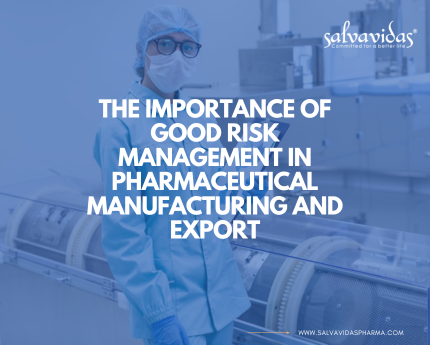
The Importance of Good Risk Management in Pharmaceutical Manufacturing and Export
Introduction:
Pharmaceutical manufacturing and export is a complex and highly regulated process. From sourcing raw materials to producing finished products, pharmaceutical companies must adhere to strict quality and safety standards at every step of the way. Failure to comply with these standards can result in serious consequences, such as product recalls, loss of reputation, and even legal action. This is where good risk management comes in.
Understanding Risk Management in Pharmaceutical Manufacturing and Export
Risk management is the process of identifying, assessing, and controlling risks in order to minimize their impact on a company’s operations and bottom line. In pharmaceutical manufacturing and export, risks can come in many forms, such as quality control issues, supply chain disruptions, regulatory non-compliance, and product liability lawsuits. By implementing good risk management practices, pharmaceutical companies can identify potential risks and take steps to mitigate them before they become major problems.
Importance of Good Risk Management in Pharmaceutical Manufacturing and Export
Good risk management is essential in pharmaceutical manufacturing and export for several reasons. First and foremost, it helps to ensure the safety and efficacy of pharmaceutical products. By identifying and addressing potential risks in the manufacturing process, companies can ensure that their products meet the highest quality and safety standards. Additionally, good risk management can help companies avoid costly mistakes, such as product recalls or legal action, which can damage their reputation and bottom line.
Key Elements of Good Risk Management in Pharmaceutical Manufacturing and Export
There are several key elements of good risk management in pharmaceutical manufacturing and export, including:
- Risk assessment: Identifying potential risks and their impact on the manufacturing process and the final product.
- Risk evaluation: Assessing the likelihood and severity of identified risks.
- Risk control: Developing and implementing measures to mitigate identified risks.
- Risk monitoring: Continuously monitoring the effectiveness of risk control measures and adjusting them as needed.
Benefits of Good Risk Management in Pharmaceutical Manufacturing and Export
Implementing good risk management practices in pharmaceutical manufacturing and export can offer numerous benefits, such as:
- Improved product quality and safety
- Reduced risk of product recalls and legal action
- Enhanced reputation and customer trust
- Improved efficiency and productivity
- Reduced costs associated with non-compliance and product defects.
FAQs About Risk Management in Pharmaceutical Manufacturing and Export
Q: What are the consequences of poor risk management in pharmaceutical manufacturing and export?
A: Poor risk management can lead to a wide range of consequences, including product recalls, legal action, damage to reputation, and loss of revenue.
Q: What are some common risks in pharmaceutical manufacturing and export?
A: Common risks include quality control issues, supply chain disruptions, regulatory non-compliance, and product liability lawsuits.
Q: How can companies implement good risk management practices in pharmaceutical manufacturing and export?
A: Companies can implement good risk management practices by conducting regular risk assessments, developing and implementing risk control measures, and continuously monitoring and adjusting their risk management strategies.
Conclusion
Good risk management is crucial in pharmaceutical manufacturing and export. By identifying potential risks and taking steps to mitigate them, pharmaceutical companies can ensure the safety and efficacy of their products, as well as avoid costly mistakes that can damage their reputation and bottom line. Implementing good risk management practices requires a proactive and systematic approach to identifying and controlling risks, which involves the entire organization, from management to employees on the factory floor.
In summary, good risk management practices are essential in pharmaceutical manufacturing and export, and companies that prioritize risk management will be better positioned to meet the needs of their customers and succeed in the highly competitive and regulated pharmaceutical industry. By investing in risk management, companies can protect their brand reputation, avoid costly mistakes, and ensure the safety and efficacy of their products.




0